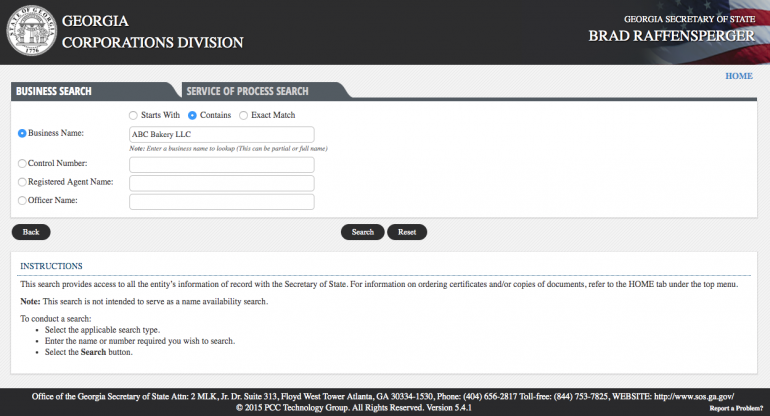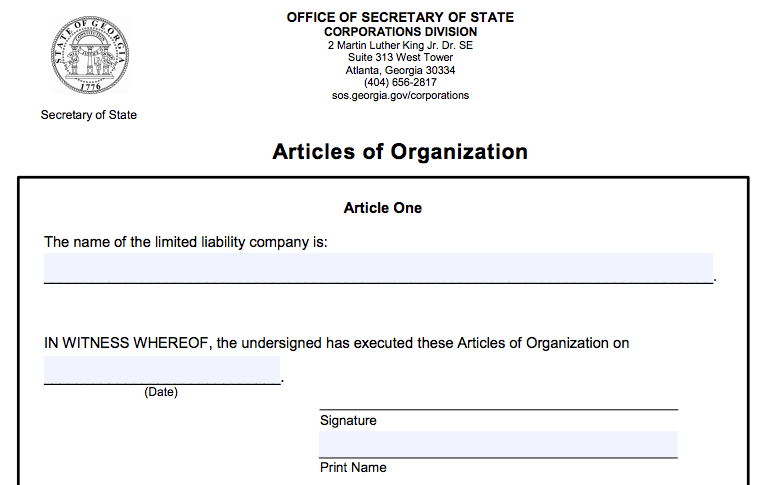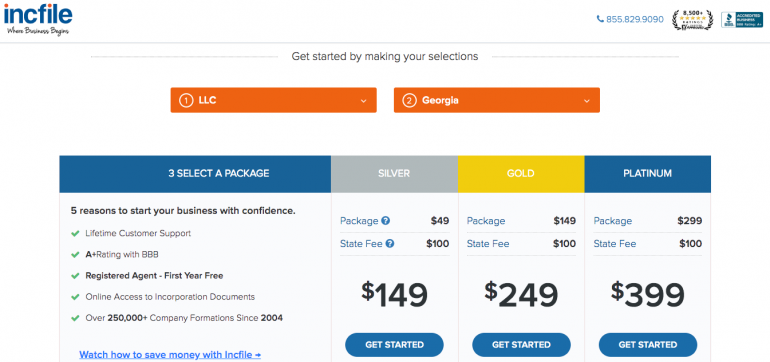How to Form an LLC in Georgia: A Step-by-Step Guide
Read the steps required to form an LLC in Georgia, including filing articles of organization at a cost of $100.

Many, or all, of the products featured on this page are from our advertising partners who compensate us when you take certain actions on our website or click to take an action on their website. However, this does not influence our evaluations. Our opinions are our own. Here is a list of our partners and here's how we make money.
If you want to reap the benefits of launching a small business in Georgia, you’ll need to decide what type of business entity structure your company should have. Limited liability company (LLC) is a popular structure among small-business owners because it offers flexibility, tax advantages and simpler requirements than a corporation. This guide explains how to form an LLC in Georgia with step-by-step instructions.
How to form an LLC in Georgia
Forming an LLC in Georgia is relatively simple. You’ll need to register your business with the Georgia secretary of state, who defines the rules and procedures for LLC formation in the state.
Step 1: Choose a name for your LLC
The first decision you’ll have to make its choosing a name for your company. You might already have a name in mind or might need to come up with one from scratch.
Name requirements
The name of your LLC must be distinguishable from other businesses that are registered with the Georgia secretary of state. In addition, the name must end with one of the following words: limited liability company, limited company or the abbreviations LLC, L.L.C., LC or L.C. You can abbreviate limited as “Ltd.” or “Ltd.” and company as “Co” or “Co.”
The use of certain words in your company name is prohibited and requires special approval from the state. These include words associated with insurance, banking and education. For example, you cannot use any of the following words in your LLC’s name unless you have special permission: insurance, surety, bank, trust, college and university. You also can’t use words like “corporation” or “limited partnership,” which might suggest that the company is another type of business entity.
Georgia’s LLC statute allows licensed professionals, like doctors and lawyers, to form LLCs. In some other states, there are restrictions on the types of businesses that professionals can start, but there’s no limitation in Georgia. Georgia doesn’t recognize the Professional LLC (PLLC) as a legal business structure. Professionals can, however, form a professional corporation (PC).
Name reservations
Once you narrow down a name for your business, you can head over to Georgia’s business search website to see if the name is available. If it is, you can reserve the business name for up to 30 days by submitting a name reservation request form, either online or by mail. There’s a $25 fee for name reservation in Georgia.
Keep in mind that reserving a name doesn’t guarantee that the name conforms to trademark laws or federal laws. If you have any doubt about a name’s suitability, it’s best to consult a lawyer.

Step 2: Choose a registered agent in Georgia
The next step to LLC formation is to choose a registered agent for your Georgia LLC. A registered agent is a person or organization that accepts official mail and service of process on your company’s behalf. If the state or a legal claimant needs to contact you, they will use the registered agent’s address, which is called the registered office.
A member of the LLC can serve as the registered agent, but for practical purposes, most companies use a business attorney or registered agent service. If you use an individual as your Georgia LLC’s registered agent, they must be a resident of Georgia and available to accept mail during normal business hours. Every registered agent must maintain a registered office in Georgia with a physical address (no P.O. boxes).
Should you need registered agent service, we recommend Incfile. It will include one year of free registered agent service with LLC formation.
Step 3: Obtain Georgia business permits
In order to operate your business in Georgia, you’ll need to obtain a general business license from the city or county. Certain professional industries require special licensing.
LLCs with employees will also need to apply for a Georgia state taxpayer identification number and workers compensation insurance.
Unlike many states, Georgia does not require statewide fictitious business name/DBA filings. However, if your business operates under a trade name that’s different from your business’s legal name (e.g. Joe’s Bakery and Restaurant, LLC operating as Joe’s Bakery), then you’ll need to file a registration statement with your county’s superior court clerk.
Step 4: File articles of organization and transmittal form
Until you file your articles of organization, your Georgia LLC isn’t officially set up yet. The articles of organization contain basic formation and contact information for your company and authorize your company to operate in the state. You can file the articles of organization online or by mail, along with a filing fee of $100.
The appropriate form for domestic LLCs — those that are organized under the laws of Georgia — is Form CD 030. Compared to other states, Georgia’s articles of organization document is very short. All you need to note down is the LLC’s name and the signature of the person filling out the form. That could be a member, manager, lawyer for the LLC or another organizer.
Business owners who choose to submit the articles of organization by mail will also need to file a completed transmittal form. The transmittal form contains more information about the company, including the legal name, business address, member names and addresses and registered agent information. A transmittal form is not needed if you file your articles online.
Your business officially starts on the day that the secretary of state receives your articles of organization. The secretary of state will process your filing and mail a certificate of organization to your business address within five to seven business days. Occasionally, processing can take up to 12 business days.
If you formed an LLC in a different state and now want to operate in Georgia, most of the same rules apply, but you’re considered a foreign LLC. In this case, you’ll need to fill out a different form in lieu of the traditional articles of organization. This form is Form 241-Application for Certificate of Authority for Foreign Limited Liability Company. The filing fee for foreign LLCs looking to do business in Georgia is $225.

Step 5: Draft an LLC operating agreement
Next up on your list is to create an LLC operating agreement. Although Georgia doesn’t require LLCs to have an operating agreement, you should consider this an essential step. An LLC operating agreement lays out the rights, responsibilities and profit and loss shares of each owner in an LLC. Even if you have a single-member LLC, an operating agreement is highly recommended because it summarizes the operating procedures of the LLC. This is where you turn to in order to document your meeting schedule, voting rights and tax preferences.
Step 6: Pay taxes, and comply with other state requirements
Taxes for a Georgia LLC depend on how the LLC’s members choose to be taxed. By default, LLCs are taxed as sole proprietorships (if single-member) or partnerships (if multi-member), in which case business income and losses are reported on each business owner’s personal tax return. Each business owner pays Georgia income taxes on its share of the business profits.
If the LLC chooses to be taxed as a corporation, then the LLC will have to pay an annual state corporate tax. LLCs taxed as corporations also have to pay a net worth tax based on the assets of the company.
Remember, it’s not just income taxes that a company has to pay. Georgia businesses with employees also should be prepared to pay payroll taxes. The Georgia payroll tax rate currently ranges from 0.04% to 8.1% on the first $9,500 of wages.
Step 7: File annual registration report
Georgia LLCs must file an annual registration statement with the secretary of state. The purpose of this annual filing is to ensure that your business address, registered agent and registered office information are up to date. The annual registration statement is due between Jan. 1 and April 1 of each year (the first statement is due the calendar year following your year of formation). You must either file your registration statement online or print a form from the website to mail in. The filing fee for annual registration is $50.
Once you submit your registration statement, if any relevant business information changes (e.g. such as your registered agent), you must submit an amended annual registration statement with a $20 fee.
Step 8: Comply with federal requirements
LLCs organized in Georgia must comply not only with state requirements but also with federal requirements. For example, LLCs taxed as corporations and any LLC with employees must apply for a federal employer identification number (EIN) for tax purposes.
You’ll also need to pay federal income taxes and payroll taxes. Federal income taxes differ based on whether the LLC is taxed as a pass-through entity or corporation. If your LLC is taxed as a pass-through entity, federal law allows you to deduct 20% of your LLC’s income before paying personal income taxes on any business profits. Corporations are taxed at a flat 21%.
Federal payroll taxes cover Social Security and Medicare. LLC members typically have to pay the employer and employee share of these taxes — called self-employment taxes — on any distributions from the business. They also have to withhold payroll taxes from employees and pay the employer tax on employee wages. Currently, the employer tax for Social Security and Medicare is 7.65%, and the employee tax for Social Security and Medicare is 7.65%.
Advantages and disadvantages of forming an LLC in Georgia
Every state has different requirements for forming and maintaining a business. The good news is that you can form your business in any state, even if it’s not where your headquarters or main office is located. Every state allows out-of-state, or “foreign LLCs” to do business in its state as long as the business pays taxes and complies with other state regulations.
If you’re planning on forming an LLC in Georgia, evaluate the pros and cons first:
Advantages
- LLC members enjoy limited personal liability for business debts and obligations.
- LLCs can choose their tax treatment.
- Online filing is available for all LLC forms in Georgia.
- An LLC operating agreement isn’t legally required in Georgia (though still highly recommended).
- Georgia has relatively affordable LLC filing fees ($100) and annual registration fees ($50).
Disadvantages
- Georgia LLCs taxed as corporations must pay an annual corporate tax and net worth tax.
- Georgia payroll taxes are relatively high compared to other states for LLCs with employees.
- LLCs require more paperwork than a sole proprietorship or general partnership.
- It’s harder to raise investor money for an LLC, compared to a corporation.
- The filing fee for foreign LLCs in Georgia is relatively high ($225).

If you need additional guidance, we suggest consulting a business lawyer or using a business formation service such as Incfile. Starting for just $49 plus state filing fees ($100 in Georgia), Incfile will file all formation paperwork on your behalf, give you an electronic copy of the filed paperwork and provide one year of free registered agent service. For an additional fee, Incfile will even draft a custom LLC operating agreement for your company.
A version of this article was first published on Fundera, a subsidiary of NerdWallet.
Article sources
NerdWallet writers are subject matter authorities who use primary,
trustworthy sources to inform their work, including peer-reviewed
studies, government websites, academic research and interviews with
industry experts. All content is fact-checked for accuracy, timeliness
and relevance. You can learn more about NerdWallet's high
standards for journalism by reading our
editorial guidelines.
More like this
Related articles







